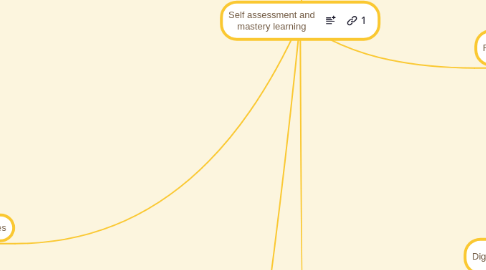
1. Self assessment principles
1.1. How to employ them
1.1.1. Regularity
1.1.2. Interleaved
1.1.3. Rapid feedback
1.1.4. Informative failure
1.2. Who creates them?
1.2.1. Tutor
1.2.2. student-created activities
1.2.2.1. peerwise
1.2.2.2. flash cards
1.2.2.3. Creating content for peer review
1.3. Purpose and scope?
1.3.1. Self assessing knowledge
1.3.1.1. Designing good questions
1.3.1.1.1. Writing good multiple choice questions
1.3.1.1.2. Objective test questions
1.3.1.2. Giving good feedback
1.3.1.2.1. Psychological factors
1.3.1.2.2. effective feedback
1.3.1.2.3. 7 principles
1.3.2. Self assessing skill / metacognition
1.3.2.1. (0) design tasks so students engage with rubrics and can use to assess own work. (engaging with standards and criteria, self-assessment)
1.3.2.2. Jones et al
1.3.2.2.1. "(1) deconstruction of the rubric and standardising the marking method; (2) examples and exemplars; (3) peer review; (4) self-review; and (5) a reflective diary. "
1.3.2.3. Hughes et al
1.3.2.3.1. -Develop self-reliance -Make learning visible through ipsative task
1.4. Encourage engagement with formative work
1.4.1. playful learning
1.4.2. combining formative with summative, allowing safe way to learn from failing, Voelgel, 2013
2. The practice
2.1. Tools to support
2.1.1. advantages and disadvantages of different techniques
2.1.1.1. flash cards through to student-created stuff, pros and cons
2.1.1.2. drag and drop versus mcq?
2.1.1.3. refer back to Why this matters.
2.1.1.4. xerte page types demo - consider which ones lend themselves to add value to learner?
2.1.2. quiz tools
2.1.2.1. affordances of the tools
2.1.2.1.1. Reuseable
2.1.2.1.2. Inclusion
2.1.2.1.3. Media support?
2.1.2.1.4. Quality of feedback possible
2.1.2.2. tools
2.1.2.2.1. Xerte
2.1.2.2.2. quia
2.1.2.2.3. quizlet
2.1.2.2.4. vle tools
2.1.2.2.5. H5P
2.1.2.2.6. Google Form
2.1.2.2.7. Qualtrics or other survey tool
2.2. Guest speaker - Dave Foord
2.2.1. Dave:formative assessment conundrum
2.2.1.1. add value to quiz
2.2.1.1.1. multi-choice makes quiz work harder for learner with same effort to create
2.2.1.1.2. add more options to choose from, not just 1 to 1 matching exercise
2.2.1.2. Categorisation: Geoff Petty
2.2.1.2.1. People retain info better when spatial (grid, venn)
3. Why this matters
3.1. define SA and ML
3.1.1. chat to draw this out from delegates
3.2. whole group progression
3.3. Learning gain
3.4. 10 benefits of testing
4. teacher skills, frameworks
4.1. DigCompEdu
4.2. UK Prof Standards Framework
4.3. Teaching Excellence Framework
4.4. Bloom's taxonomy
5. Research issues
5.1. Elements of good formative assessment - BIS Research
5.1.1. See also Looney 2007
5.2. Key variables
5.2.1. Student ability
5.2.2. Feedback and remediation
5.2.2.1. Moving beyond feedback. See Hughes et al, 2014
5.2.3. Subject
5.2.4. Longevity
5.2.5. Cultural context
